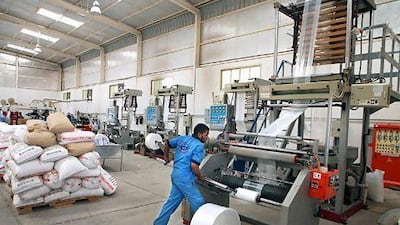Record growth in new orders helped to propel a measure of business confidence to its strongest level in 20 months in December, ensuring the economy entered the new year on a positive note.
Healthy exports growth and a surge in job creation also sustained the pickup within HSBC's purchasing managers index (PMI) survey of the non-oil private sector.
"While the UAE will still likely lag some of its neighbours, the economy enters 2013 at its most positive in five years," said Simon Williams, the chief economist for Middle East and North Africa at HSBC.
"It is a fitting reading to mark the end of a strong recovery for the UAE. Good output growth, firm new orders from home and abroad and a pickup in job creation point to an economy that is growing at a solid pace and well placed to maintain momentum."
The headline index hit 55.6, a two-point gain from the previous month, and its highest level since 57.5 in April 2011.
The 50 mark separates a decline from a rise in activity.
Echoing the robust reading in the UAE, Saudi Arabia's PMI data also pointed to a strengthening private sector. The kingdom's headline index rose to 58.9, up from 57 the month before.
Sustaining the UAE's growth was a rise in output to its highest level since May 2011. New orders rose to 63, the highest reading in the survey's three and a half year history. About 38 per cent of respondents reported a rise in order book volumes, citing improving conditions in the domestic economy.
"The most positive aspect of the last quarter's data in our view is that domestic demand in the UAE appears to be recovering well, even in the absence of the substantial fiscal stimulus that has boosted demand in Saudi Arabia," Khatija Haque, a senior economist at Emirates NBD, wrote in a research note.
Companies were also inundated with more export orders from abroad. Although the increase was marginally less than the month before, almost 17 per cent of surveyed companies recorded higher levels of new business, with less than 4 per cent indicating a fall.
The survey also revealed buying activity was picking up. The rate at which purchasing activity rose was the sharpest in 18 months and one of the fastest in the series history.
The data adds to existing signs of a turnaround in the bedrock of the country's non-oil economy. Trade, tourism and transport have all rebounded since the global financial crisis. GDP expansion was forecast to rise by 4 per cent last year, according to the IMF.
Other signs of a recovery also emerged from the report. Job creation accelerated to its highest level in five months, completing a year of monthly rises in workforce numbers. Higher workload was cited by companies as the main reason for employing more staff. However, the vast majority of respondents indicated no change in average staff wages.
Continuing the pattern throughout most of last year, how much companies charge customers for their goods and services remained broadly flat. Although input prices rose again during the month, output prices were little changed. The trend reflected spare capacity in the economy as well as competition from other businesses, HSBC said.

